|
|
|
Sort Order |
|
|
|
Items / Page
|
|
|
|
|
|
|
| Srl | Item |
| 1 |
ID:
089202
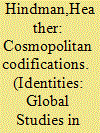

|
|
|
|
|
| Publication |
2009.
|
| Summary/Abstract |
Globalization has been the site of many renegotiations of identity, both at the supra- and subnational levels. Yet, there is an interstitial zone of communication between the global and the local in which distinct processes of boundary-making and translation take place. This essay examines mediators of internationalization, elite nationals and expatriate employees, as they negotiate the form that difference can take in the global marketplace. The contentious politics of Nepalese nationalism as well as South Asian colonial delineations of difference provide precedents for the current social practices of a cosmopolitan population that establishes a hierarchy of difference while also excusing themselves from demarcation and restricting the purview of the concept of culture. The result is a zone made safe for the operation of neoliberal business (a practice seen to be without history or geography) with alterity only allowed in narrowly commodifiable settings.
|
|
|
|
|
|
|
|
|
|
|
|
|
|
|
|
| 2 |
ID:
078561
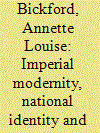

|
|
|
|
|
| Publication |
2007.
|
| Summary/Abstract |
This article draws upon the fascinating and little known 1931 Samarcand Arson Case involving the possible execution of adolescent white female inmates at a juvenile reformatory in North Carolina. Marked by nationalist discourses, the spectacle generated by this case indicates much about how white New South advocates construed national life and sought to construct a white 'civilised' collective identity, defending their region from Northern charges of Southern barbarism and asserting their place within the imperial politics of American nation building. The decision not to execute any of the sixteen defendants was informed by a series of interconnected ideas about sexuality, national danger, 'civilisation' and 'race,' suggesting that the presumed 'legal chivalry' extended to the young defendants was not a simple matter of gender bias, but involved a nuanced set of reasons related to negotiations of national belonging through racialised alliances
|
|
|
|
|
|
|
|
|
|
|
|
|
|
|
|
| 3 |
ID:
190086
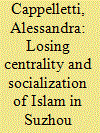

|
|
|
|
|
| Summary/Abstract |
Cultural and political alterity in China is levelled by disrupting local communities and networks, both necessary to keep memories and sense of identity alive through sharing and socialising. By taking Suzhou’s mosques as focal lens, the author assesses an experiential void which is politically and socially created, and shows the consequences of rewriting history. The broken nexus between buildings, communities and memories impacts the historical centrality and socialization of Islam in Suzhou, where communities are dispersed and shared memories are lost. Mosques’ positionality in the urban fabric is assessed through interviews and interaction with local Muslims, and the identification of past surrounding communities and networks. The assessment of the heterotopic dimension and contested memories of Suzhou’s mosques in a contemporary context — performed by collecting historical, intellectual, topographical and architectural fragments — allows us to grasp the highly symbolic dimensions of a past diversity in identity spaces. The role of communities in relation with the city’s rich intellectual past — including its tradition of literati translating Islamic classics from Persian to Chinese — is understood as central, together with a spiritual geography made of connections and relations among places.
|
|
|
|
|
|
|
|
|
|
|
|
|
|
|
|
| 4 |
ID:
116586
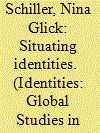

|
|
|
|
|
| Publication |
2012.
|
| Summary/Abstract |
This article queries the pervasiveness of binary thinking in contemporary identity studies. Reviewing the genealogy of binary alterity beginning with the synergies between the European Enlightenment and colonialism, I note the binary logics that remained embedded within the apparently disparate schools of structuralist and poststructuralist theory. Even the social constructionism of post-colonial scholarship became transmuted through a celebration of radical relativism into a legitimation of continued racialised or culturalised inequalities. To counter this position, I build on but also critique efforts to theorisations of relationalities. A reconstituted identity studies requires the theorisation of unequal globe-spanning imperial power and its contestations through domains of mutual practice. If we set aside an assumption of binaries of difference, such domains of relationship can be found as people meet in terms of their commonalities of experience and aspirations for equality, justice and respect.
|
|
|
|
|
|
|
|
|
|
|
|
|
|
|
|
| 5 |
ID:
098751
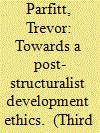

|
|
|
|
|
| Publication |
2010.
|
| Summary/Abstract |
The validity of development has been cast into doubt by postmodern critiques that have highlighted its failings. Attempts to rehabilitate the idea of development have brought ethics into play. This paper examines attempts to identify a viable basis for development based on post-structuralist ethical theories developed by analysts such as Levinas and Derrida that privilege the concept of alterity, or respect for the other. This approach is contrasted with Badiou's influential critique of an alterity-based ethics, critically examining his alternative of an ethics of the same. The article concludes by incorporating some of Badiou's insights into a reformulated ethics of alterity.
|
|
|
|
|
|
|
|
|
|
|
|
|
|
|
|
| 6 |
ID:
097727
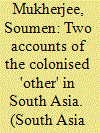

|
|
|
|
|
| Publication |
2010.
|
| Summary/Abstract |
Taking examples from South Asia, this article shows how British colonial knowledge about the non-European 'other' hinged substantially on the participation of sections of that other, especially in the context of liminal groups, for whom no ready standardised formula of identification was available. Development of a colonial episteme often involved active intervention from the colonised body, thereby dispelling any strict notion of coloniser-colonised alterity and mere top-down governance. This process of identity construction took place in several arenas and also involved negotiations in courts of law, where rival sections of the amorphous colonised body fought for competing ideals of selfhood. Complementing this legal construction were ethnographic formulations, internally diverse, and often relating to broader politico-intellectual concerns and debates of the Empire, at different planes in different ways. The article explicates their theoretical bases and practical modalities.
|
|
|
|
|
|
|
|
|
|
|
|
|
|
|
|
| 7 |
ID:
183690
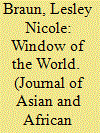

|
|
|
|
|
| Summary/Abstract |
Located in the manufacturing hub of Shenzhen is Window of the World: a Chinese theme park that features miniature copies of heritage sites from around the world. The individuals living within this constructed simulation are imported from diverse countries. They come to work as performers, animating the different cultural pavilions. As such, the transnationalism made possible by this park provides a window through which we can observe cultural interactivity, as well as the ways in which culture is constructed and re-presented. This article examines some of the processes of cultural encounters through copies of commodified cultural heritage. It also sheds light on the ways in which Kung Fu movies circulating in Africa have inspired the imaginations of young people, revealing cultural feedback loops that provide openings for new contact. Grounded in ethnographic research, the findings here are based on interviews with Kenyan and South African contract workers at this theme park. This article explores young people’s pursuits of new opportunities of identity-formation and self-representation, as well as economic stability and forward mobility.
|
|
|
|
|
|
|
|
|
|
|
|
|
|
|
|
|
|
|
|
|